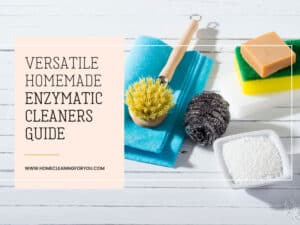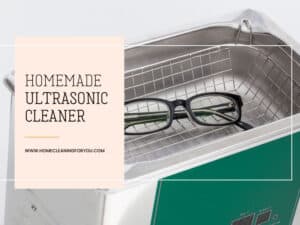10+ Simple DIY Paint Brush Cleaners for Spotless Results
Has it ever crossed your mind why you need to have your own homemade paint brush cleaners since everything is sold and readily available at any commercial venue nowadays?
Well, the reason is that the chemicals used in those products are much more toxic and harmful than you think. If you are someone who paints regularly, you sure do not want to expose yourself to any of those chemicals.
Good homemade paint brush cleaners will help you to get rid of the paint and pigment of your brush. Moreover, they will help preserve and extend the lifespan of your paint brushes, so you don’t have to buy new ones every so often. Let’s dig deeper.

12 Amazing Homemade Paint Brush Cleaners
You can see paint brushes almost everywhere. And if you are a painter, you’ll use them every day, thus raising a question: How can you clean them perfectly? Lucky for you, I have 12 methods of suiting different kinds of paint.
Classic Homemade Paint Brush Cleaner For Oil-Based Paint (With Mineral Spirits & Fabric Softener)
Mineral spirit (or mineral turpentine/white spirit) – a transparent organic solvent derived from petroleum, popularly used as a paint thinner (works best on oil-based paint), and is water-insoluble in nature.
Let’s look at how to use this cleaning agent to your advantage by following these few simple steps.
How To Make & Use It:
- Step 1 – Remove the excess paint with your fingers.
- Step 2 – Soak your paint brushes in 2 cups filled with mineral spirits for a few minutes (make sure the bristles are fully covered in the solution).
- Step 3 – Clean the paint from the bristles thoroughly by using swirling motions till all the color has dropped off and sink to the bottom of the cup.
- Step 4 – If the oil-based paint is loose, don’t attempt to soak it for longer as it may damage/thin the bristles. Instead, comb out the color using an old hairbrush then re-soak it into the solution.
- Step 5 – Soak the paint brushes in 4 cups of hot water mixed with 1 cup of fabric softener, then rinse through till the water turns clear. Gently squeeze out excess and leave the brush horizontally to let it dry.
Mineral spirits will get rid of oil paints in your paint brushes. You can see this video to know more:
Must-Try Homemade Paint Brush Cleaner For Shellac Paint (With Denatured Alcohol)
Denatured alcohol, otherwise known as methylated spirits, is a widely used solvent that can efficiently dissolve many substances, such as wax, glue, and paint. Using denatured alcohol is the surest way to remove every trace of stain from your brush.
How To Make & Use It:
- Step 1 – Mix 1 cup of denatured alcohol and 1 cup of warm water in a glass bowl.
- Step 2 – Soak your paint brushes in the liquid for approximately 5 minutes.
- Step 3 – Comb through the excess paint using an old hairbrush or a specialized brush, and rinse with water till it turns clear.
- Step 4 – Use a paper towel to dry your paint brushes.
Silky Soft Homemade Paint Brush Cleaner (With Fabric Softener)

Fabric softener is a staple in every household. And what’s even cooler about it is that you can use it to clean your paint brushes. I swear your brushes become so soft and clean afterward (only works on water-based paint such as acrylic or latex). Here’s how.
How To Make & Use It:
- Step 1 – Prepare a bucket, fill it with 4 cups of warm water and ⅛ cup of fabric softener, or ½ cup of softener to 1 gallon of warm water if it’s a large batch (depending on the size of your paint brushes and rollers).
- Step 2 – Wipe out/remove excess paint if possible.
- Step 3 – Swirl the brushes well till color fully comes off and sink to the bottom of the bucket.
- Step 4 – Rinse the brushes & roller to remove excess solution. Wipe the remaining water & lay them flat to dry.
Easy DIY Paint Brush Cleaner (With Baby Oil)

If you have young children at home, you may have a bottle of baby oil in your cabinet ready for use. Luckily, you can also use it to remove oil-based paint. The pro of using this method is that it’s non-drying and will leave the bristles feeling soft & nourished.
How To Make & Use It:
- Step 1 – Coat the paint brush fully with baby oil. Make sure to work the oil into each part of the bristle (if you’re afraid of the paint stains on your hands, wear a pair of latex gloves)
- Step 2 – Once it’s nicely coated, use your fingers or a soft cloth to remove all the paint from the brush (do it slowly to avoid bristle breakage/damage). Repeat these steps a few rounds till all the color is removed.
- Step 3 – Give it a good wash in slightly soapy warm water and rinse off till clear. Squeeze out excess water & dry it horizontally on a paper towel.
Best Oil Paint Brush Cleaner (With Linseed Oil)

I love using natural oils and incorporating them into my everyday life, including cleaning my paint brushes. Linseed oil is well-loved and widely known for its ability to remove oil stains and paints, as well as other important health benefits.
How To Make & Use It:
- Step 1 – Pour some linseed oil on a piece of paper (Rough paper is best since the oil doesn’t transfer through the paper).
- Step 2 – Soak the brush bristles in the linseed oil. Coat it thoroughly till every single hair has touched the oil.
- Step 3 – Rotate the paint brush to let all the pigment come out. Repeat a few times.
- Step 4 – To ensure the brush is pristine, wash it in warm, slightly soapy water and rinse with water. Lay it dry.
Inexpensive Homemade Paint Brush Cleaner (With White Vinegar)

Vinegar is a powerhouse when it comes to cleaning. I use it to clean pretty much everything in my house, including my paint brushes. It is inexpensive, non-toxic, and an all-natural cleaning detergent that does not harm your health or the environment.(1)
How To Make & Use It:
- Step 1 – In a pot, pour some white vinegar and turn on the flame to bring it to boil/simmer.
- Step 2 – Transfer the boiled vinegar into a glass and soak your paint brushes in it for around 20 minutes.
- Step 3 – When the vinegar has turned cold, get rid of the remaining paint with a metal wire brush.
- Step 4 – Wash the brushes in some warm soapy water (1 tbsp of soap : 1 cup of warm water) to remove the smell of vinegar.
- Step 4 – Leave the brushes horizontally to dry.
One pot of boiling white vinegar will restore the quality of your paint brushes. You can see this video to know more:
Alternative DIY Paint Brush Cleaner (With Apple Cider Vinegar)

If you dislike the strong smell of white vinegar, consider switching to apple cider vinegar as a more pleasant alternative. Similar to fabric softener, it works best for water-based paint.
While it might take a little while to clean, you’ll definitely get used to it once you’ve got the hang of it.
How To Make & Use It:
- Step 1 – Similar to the white vinegar method, once boiled, transfer the boiled apple cider vinegar into a jar (enough to fully cover the bristles of the brush)
- Step 2 – Let the paintbrush soaked in the liquid overnight.
- Step 3 – Gently scrub out leftover paint and rinse it off the next morning. Lay flat horizontally to let the brush dry.
Effective Paint Brush Cleaner (Using Rubbing Alcohol Or Acetone)

Rubbing alcohol or acetone is super popular as a cleaning agent, especially for dried acrylic and oil paint brushes. (2) All you need is a can of rubbing alcohol/acetone, they are really cheap, and you can easily find them at your local supermarket. Let’s learn how.
How To Use It:
- Step 1 – Prepare a glass/jar and pour in a bit of acetone or rubbing alcohol (either one will strip the paint off the bristles just fine).
- Step 2 – Soak the paint brush into the jar with acetone/rubbing alcohol for a few minutes (not too long; otherwise, the chemicals will eat the bristles away).
- Step 3 – Swirl the paint brush in the jar for a while and wipe it until the colors are gone.
Note: Acetone/rubbing alcohol cannot be used on synthetic brushes (it will damage the bristles severely). Also, this method works best when you’ve just finished painting or want to switch to another color as this is a quick clean method.
Homemade Paint Brush Cleaner For General Cleaning (Using Soapy Water)

I always think that regular cleaning and maintenance is much more effective than fixing the problems once they occur. It’s really easy, and your brushes will be good as new even if you use them daily. Here’s how.
How To Make & Use It:
- Step 1 – Once you’re done painting, rinse the paint brush under water (make sure it’s NOT hot) and use your fingers to rub off the wet paint from the bristles gently.
- Step 2 – Grab a bottle of mild shampoo or soap and squeeze out a few drops directly on the bristles. Rub it and make sure to get inside the center of the brush to remove the excess paint that is usually hidden.
- Step 3 – Rinse the brush thoroughly till water is clear, and dab the bristles gently on a paper towel. Lay flat to dry.
On-The-Go Paint Brush Cleaner (Using Hand Sanitizing Gel)

This is probably by far the most creative method I have ever used. It’s so straightforward and perfect for those who are constantly on-the-go. All you need is a bottle of hand sanitizing gel, and you’re all set.
How To Use It:
- Step 1 – Squeeze out a few drops of hand sanitizing gel onto the palm of your hand, and clean the paint brush in circular motions to loosen the paint from the bristles (continue to do so till most of the color has come off).
- Step 2 – Grab some paper towels and wipe the excess paint.
- Step 3 – Rinse it off under water before dabbing it dry. Lay flat and let it air dry.
Single-Ingredient Paint Brush Cleaner (With Dish Soap)

If you ever run out of any of the above ingredients, stay tuned for this option as you only need a few squirts of liquid dish soap to remove oil-based paint off your paint brush.
How To Use It:
- Step 1 – Prepare by squirting some liquid dish soap into a cup/jar and make sure it’s ¼ inch thick or more. This is crucial because you want to make sure the bristles are completely immersed in the dishwashing liquid.
- Step 2 – Dip the brush into the dishwashing liquid and swirl it to loosen the paint.
- Step 3 – Wipe off the detergent and paint on the rag/paper towel again (repeat this process a few times to remove the paint completely).
- Step 4 – Give the paint brush a final rinse till the water runs clear.
- Step 5 – This is a bonus step if the paint is heavily stuck in the bristles. After doing the 4 steps above, you can soak the brush in the soap water combination and scrub it till all the paint comes out. Once completely clean, leave it out to dry.
No-Fuss Paint Brush Cleaner For Dried Paint (With A Fine-Tooth Comb)

Most people, when painting, focus on how to make it perfect but do not necessarily think about equipping themselves with specialized cleaners and tools that they need to have for cleaning these brushes once done using.
Hence, this old-school method is perfect for those scenarios. With just an old fine-tooth comb, you can get all the old dried paint off your brushes without any other fancy tools.
How To Use It:
- Step 1 – Apply a thin coat of oil or water onto the paint brush (this part is essential since it will help release the paint from the bristles of the brush as well as partly moisturize it).
- Step 2 – Grip the paint brush firmly to maintain a good degree of control, and use a fine-tooth comb (an old one will do) and comb through the bristles gently. Add some more oil or water if needed.
- Step 3 – Once the old, dried paint has been thoroughly combed out, wipe the paint brush and rinse it under water. Lay flat to dry.
Let’s check how long it takes to comb out all the paint in your brushes!
7 Must-Know Tips For Maintaining Your Paint Brushes
Yes, finally the paint has come off, and you want the paint brushes to stay in their best shape for future use (minus the hassle). Below are the 7 important tips that you should employ to maintain your paint brushes in the best condition.
- Take your time to clean the paint brushes between painting sessions, even if you use the same paint/color after that. The reason is by doing it diligently, and you won’t have crumbs of dried paint sticking to paint brushes and reducing the quality of your painting.
- Always clean the brush IMMEDIATELY after each use (just look up & use one of the methods above that is fit for the type of brush & the type of paint used)
- Remove as much paint as possible before turning to any type of cleaning detergent/solution (if it’s wet, use your fingers to squeeze it out; if it’s dry, use a comb/hairbrush to comb it through).
- Wash the base of the bristles first, as the ferrule part is the most difficult to clean. So the only way to get everything out is to do it perfectly, even if it may take a while to do so (15 minutes more or less).
- DO NOT let the brush dry vertically head-side down as the water will loosen the glue that sticks the bristles together, resulting in the bristle hair falling out. Furthermore, the pressure of the water can bend and deform the shape of the bristles forever.
- After the brushes are cleaned, to ensure the shape of the bristles to their original state, squeeze out the excess water and slightly shape them like how they look initially using your fingers.
- Either store the brushes horizontally or head-side up once cleaned and dried, whichever works best for you.
A professional painter has his own way of maintaining his paint brushes. You can see this video to know more:
FAQs
Owning a paint brush/brushes can be a lot of work, and while regular cleaning and maintenance are essential, you may still come up with situations where you may not know where to find the answers. Let’s dive into these 5 frequently asked questions to find out more.
Proper Care Will Leave You With Great Paint Brushes
Cleaning and maintaining your paint brushes may not be that much of an intimidating task at all. If you care for them properly, use the right tool and the right cleaner for each type. Be diligent and creative, and your paint brushes will always be ready for your next artistic endeavors.
Feel free to share your thoughts and feelings in the comment section below. I hope the provided tips and instructions will deliver amazing results. Stay tuned for more DIY hacks from us!

References
- Healthline. 2021. What You Should Know About Cleaning with Vinegar.
- WebMD. 2021. Things to Know About Rubbing Alcohol.







Samantha Lee
Head Cleaning Expert
Expertise
Professional Home Cleaning, Green Cleaning Techniques, Stain Removal & Fabric Care, DIY Home Maintenance & Organization, Sustainable Cleaning Products, Home Care for Busy Lifestyles
Education
University of Denver
Samantha Lee is the Head Cleaning Expert at HomeCleaningForYou.com, specializing in eco-friendly home care. She holds a Bachelor of Science in Environmental Science from the University of Denver, focusing on sustainable cleaning solutions.
With expertise in green cleaning, stain removal, and DIY home maintenance, she helps homeowners keep their spaces fresh and chemical-free. Samantha has been featured in lifestyle publications and has partnered with brands promoting natural cleaning products.
She also shares practical tips through her blog, online courses, and workshops. Passionate about sustainability, she enjoys testing new eco-friendly cleaning methods and spending time outdoors.